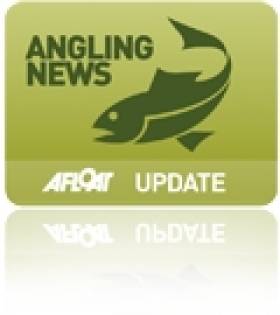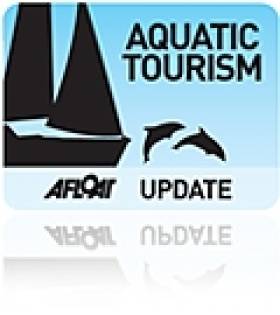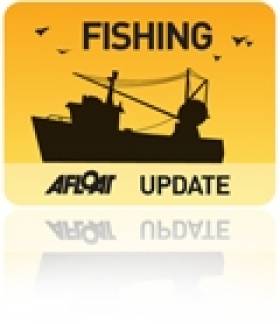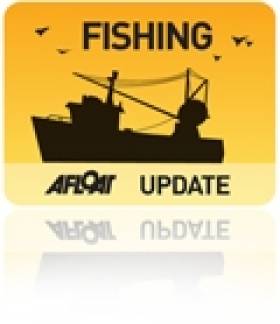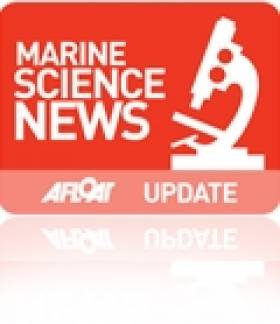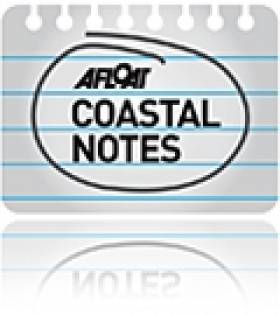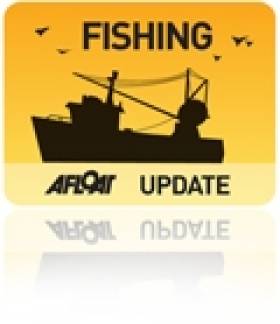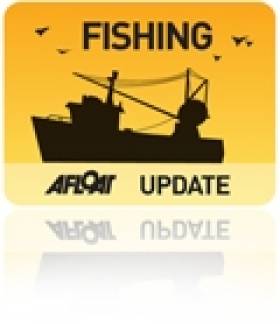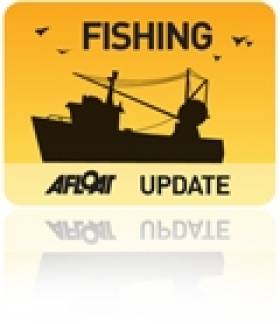Displaying items by tag: Sean Connick TD
Vigilance Urged Over Salmon Lice
Salmon farmers have been reminded of the dangers of egg-bearing lice, despite a "sustained reduction" in their numbers according to a new report.
"Pest control will always remain a challenge requiring active management," said Minister of State for Fisheries Sean Connick, as quoted by The Irish Times.
The minister spoke at the launch of a report by the National Implementation Group (NIG) for improving pest control in Ireland's salmon farms.
The report noted that the majority of facilities maintained lice level below trigger levels for treatment, and where treatment was necessary it was conducted effectively.
In response to the report, Salmon Watch Ireland (SWI) claims that the risks to wild salmonids "by inadequately regulated salmon farming" are being ignored, threatening juvenile salmon and sea trout.
It also highlighted the fact that Ireland is being pushed by the European Commission to conform salmon farming to EU Habitats Directive standards for wild salmon.
"The reality is that the regulation of the salmon farming industry is a shambles," said the SWI in a statement.
The Irish Times has more on the story HERE.
South-East's Coast, Rivers Hold Tourism Potential
Tourist anglers spent €89.9 million in Ireland in 2008, a marine leisure conference in Co Waterford heard recently.
The importance of angling to the economy was highlighted at the Rising Tide seminar in New Ross, an event focused on developing historical connections between Ireland and Newfoundland in Canada in the areas of fisheries, development and coastal tourism.
Speakers noted the "strong maritime tradition" along the south-east coast, the potential of the Waterford Estuary as a gateway to the region's inland waterways, and opportunities for development to tie in with next year's visit of the Tall Ships.
Minister of State for Fisheries, Sean Connick TD, also announced funding of €156,000 for Wexford harbours in tandem with Wexford County Council's allocation of €52,000.
The Irish Times has more on the story HERE.
Ireland Opposes Transfer of Fish Quotas to Norway
Under the EU/Norway Fisheries Agreement each year Norway and the Community swap fishing opportunities in each others waters. However, this has resulted in the EU giving fish stocks off the west coast of Ireland to Norway in exchange for Norwegian cod. Minister Connick advised his fellow Ministers of the Commissions commitment from last November "to ensure that the costs and benefits for individual Member States of the annual arrangements with Norway should be as balanced as possible".
Minister Connick said "Ireland has continually opposed what has to date been an unfair and inequitable process which results in a Member State, like Ireland which does not benefit, paying for the fishing opportunities of other Member States".
The Minister added "I want to make it crystal clear that Ireland will totally oppose any moves to include the stocks that the Irish fleet fish in the waters off the west coast such as horse mackerel and mackerel in the balance".
The Minister then re-iterated Irelands long held request for a radical re-look at the way the swaps are achieved. He said "It is very clear that there will be a major problem balancing any EU/Norway agreement this year and Ireland calls on the Commission to bring forward a new framework whereby, Member States who want to avail of the Cod on offer can contribute to a communal EU pool for exchange with Norway. In this way those Member States who want the Cod can avail of it but not to the detriment of Member States who do not benefit".
On a side topic the Minister referred to the ongoing negotiations between the EU, Norway, the Faroe Islands and Iceland on arrangements for the management of the mackerel stock which is so important economically to Ireland. The Minister restated Ireland's support of the Commissions efforts to bring about an agreement but not at any cost. The Minister said " It is in all our interests that the level of fishing on the mackerel stock is reduced and that Iceland and the Faroe islands enter into a four party coastal state arrangement for it's management" He went on to say that "Any final share out of the mackerel resource must be fair and proportionate".
Ministers Meet to Identify Fishing Priorities
Minister Connick described the meeting as "a good exchange of views on significant issues affecting all sectors of our fishing industries, north and south."
The topics discussed by the Ministers included the impacts of the Cod Recovery Plan, the management of the prawn fishery in the Irish Sea, the upcoming EU negotiations on fishing opportunities for 2011 and the Community's review of the Common Fisheries Policy.
Minister Connick said, "Minister Gildernew and I had a very good discussion. Our meeting was a valuable opportunity for us to examine these important issues together and to explore areas of mutual interest. I am committed to working together with Minister Gildernew over the coming months, to help safeguard the interests of Irish fishermen."
Minister Smith said "I am delighted to sign today a new Accord on Marine Research between Newfoundland and Labrador and the Irish Authorities. The initiative involves a partnership approach between the Fisheries and Marine Institute of Memorial University of Newfoundland and Ireland's Marine Institute including the charter of the state-of-the-art research vessel 'Celtic Explorer'. Both Institutes have strong capabilities in ocean technology and research. Through this alliance, there is now an opportunity to bring the strengths of both Institutes to greater levels".
Minister of State Connick added that "The proposed EU Atlantic Strategy under the EU Integrated Maritime Policy and the support for a Joint Programming Initiative on Healthy Seas & Oceans recently announced by Ms. Máire Geoghegan-Quinn the European Commissioner for Research, Innovation and Science, highlight the increasing importance of linking the scientific challenges on both sides of the Atlantic."
Welcoming the chartering of the RV Celtic Explorer, Mr Clyde Jackman, Minister for Fisheries and Aquaculture – Newfoundland said "It will enable our academic institutions to take their already world class research to the next level and support a state of the art fishing industry that is based on better science. This initiative will create many new opportunities for young Newfoundlanders and Labradorians, as a result of a more vibrant fishing industry and in conducting fisheries science research".
"Thanks to the support of our Provincial Government, the Marine Institute of Memorial University of Newfoundland is further positioned to play a vital role in the future of fisheries in Newfoundland and Labrador. With the chartering the RV Celtic Explorer and the creation of our new Centre for Fisheries Ecosystem Research the Marine Institute is further positioned to play a vital role in fisheries science research in our province," said Glenn Blackwood, the Executive Director of the Fisheries and Marine Institute of Memorial University of Newfoundland.
"Research lead by personnel from the Centre for Fisheries Ecosystem Research and conducted aboard the RV Celtic Explorer will help develop a better understanding of the state of Newfoundland and Labrador's fish stocks and the dynamics of its marine ecosystems, providing new information to support better decisions." he said.
"The strong alliance the Marine Institute, Ireland has with the Fisheries and Marine Institute of Memorial University of Newfoundland will enable transatlantic collaboration to support the rapidly expanding fisheries research programmes in Newfoundland waters" said Dr Peter Heffernan, CEO of the Marine Institute.
"We are delighted with this opportunity to work with such a prominent team of fisheries scientists and we look forward to exploring with our Newfoundland colleagues how we can also build stronger links as part of a wider international ocean observation initiative to study the Gulf Stream and North Atlantic Drift. This could link SMART technology to monitor climate change and environmental conditions in both Irish and Newfoundland waters and stimulate commercial spin off opportunities."
"Projects linking technologies, equipment and expertise on both sides of the Atlantic would therefore enhance Ireland and Newfoundland's capability to perform in the forefront of scientific endeavours as our strategic geographic location demands," he further added.
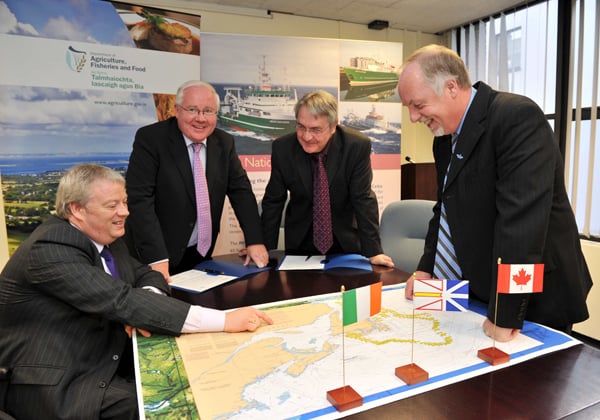
Brendan Smith TD, Minister for Agriculture, Fisheries and Food and Sean Connick TD, Minister of State at the Department of Agriculture, Fisheries and Food signing an accord with their Newfoundland counterparts Minister Clyde Jackman and Deputy Minister Alastair O’Reilly In Agriculture House.
Coastal Harbours Benefit from Infrastructure Funding
Malahide is one of over a dozen harbours around the coast to benefit from an announcement by Sean Connick TD, Minister of State at the Department of Agriculture, Fisheries and Food today that funding has been approved for harbour development projects in Local Authority owned harbours under the Fishery Harbour and Coastal Infrastructure Development Programme 2010.
Funding has been approved for projects that have been identified as priorities by each of the five Local Authorities listed below. Up to 75% of the cost of an approved project (subject to the maximum figure approved) will be available for each project with the Local Authority providing the balance. The project must be completed and funding drawn down before the end of the current calendar year. The projects are located in harbours around our coastline that are in Local Authority ownership.
Minister Connick said “The Local Authority owned fishing harbours supplement and underpin the activities undertaken in our Department of Agriculture, Fisheries and Food owned Fishery Harbour Centres. These harbours are of great importance to the fishing and aquaculture industries and provide much needed employment and support for economic activity in our coastal communities. I am delighted to be able to announce the provision of this funding to enhance and develop these facilities”.
The following is a list of the Local Authorities that have been approved funding:
|
Local Authority |
Approved Funding |
||
|
FINGAL COUNTY COUNCIL |
|||
|
Malahide - Repair to slipway |
€55,875 |
||
|
SLIGO COUNTY COUNCIL |
|||
|
Mullaghmore Harbour - Dredging of harbour |
€90,000 |
||
|
CORK COUNTY COUNCIL |
|||
|
Ballycotton - Breakwater Emergency works |
€225,000 |
||
|
WEXFORD COUNTY COUNCIL |
|||
|
Fethard harbour 1 - Fishing harbour and slipway study |
€18,750 |
||
|
Fethard Harbour 2 - Fishing harbour and slipway |
€7,500 |
||
|
Kilmore Quay Harbour - Provide a new laydown area at the end of West Pier |
€54,750 |
||
|
Courtown Harbour 1 - Health & Safety improvements |
€18,750 |
||
|
Duncannon & Hook Peninsula Piers - New CCTV system & Harbour Repairs |
€56,250 |
||
|
WEST CORK COUNTY COUNCIL |
|||
|
Castletownbere - Bank Harbour |
€18,422 |
||
|
Bantry- Doneen Pier |
€23,288 |
||
|
Schull - Lahertanavally Pier |
€24,375 |
||
|
Schull - Ballycummisk Pier |
€19,916 |
||
|
Castletownbere - Trafrask Pier |
€18,422 |
||
|
Western Division - Safety Works |
€46,369 |
||
|
Bantry Pier - Public Toilets |
€30,000 |
||
|
|
|
|
|
|
|
|
Total Estimated Cost |
€707,667 |
Connick Leads Criticism of 'Unsustainable' Mackerel Fishing by Iceland and Faeroes
Minister Connick said "I want to see a fair deal to resolve this issue and secure the future for our fishermen and fish factories. However, I made it clear that I will not accept a deal at any price."
Currently Iceland and the Faroe Islands are acting unilaterally and outside of normal fishery management protocols and their actions pose a serious threat to the well being of the mackerel stock which economically, is Ireland's most important stock. The item was placed on today's agenda in advance of the intensive negotiations on mackerel management due to commence in October and as a follow up to the June Council where Ireland lead the debate.
Minister Connick reiterated his dismay at the continuing irresponsible fishing by Iceland and the Faroes on the mackerel stock, and his desire to see a resolution to the situation. So far in 2010, Iceland has caught about 115,000 tonnes which is more than 25 times their catch four years ago. In the case of the Faroes, their 85,000 tonnes is more than 3 times their catch in 2006. Ireland's quota in 2010 is 62,000 tonnes.
The Minister said "Ireland has consistently supported the need to reach an international agreement on mackerel management. However we can only accept an agreement that is fair and proportionate. We consider that the current fishing levels by Iceland and the Faroes are totally unjustified and that any eventual agreement must involve much reduced levels of fishing by these countries. We must robustly put our case and minimise the final cost to our fishermen."
The long term stability of the lucrative mackerel stock is of paramount importance to Ireland and in urging for increased intensification of efforts to reach a solution the Minister advised the Council that "It is my opinion that a joint approach with Norway, considering our long term agreement with them, would have added weight and would be more likely to succeed".
Minister Connick said, "I was heartened by the widespread support of my EU colleagues for the concerns that I first raised on this issue at the June Council".
There will be intensive negotiations over the autumn and the Minister committed that Ireland would work closely with other Member States and the Commission to consider all options to make progress and find a basis for a long term agreement. The Minister emphasised the critical importance of securing fair and equitable arrangements at international level that will deliver a sustainable mackerel fishery for the Irish fleet and ensure the continued prosperity of the seafood processing sector in coastal communities.
Seafood Companies Get €1.75m Boost
Sean Connick TD, Minister of State at the Department of Agriculture, Fisheries and Food today announced €1.13 million in grant-aid for Irish Seafood Processing companies under the Seafood Processing Business Development Scheme, and a further €623,620 for aquaculture companies under the Commercial Aquaculture Development Scheme. This represents a total investment of €1.75 million in 15 seafood processing and aquaculture projects. Both schemes form part of the Seafood National Programme 2007-2013, funded under the National Development Plan 2007-2013. Development of both of these areas, seafood processing and aquaculture, are key elements in the recently published 2020 Food Harvest Report.
The Seafood Processing Business Development Scheme is aimed at SME’s who have solid business plans focused on adding value to Irish seafood products on both domestic and overseas markets. The qualifying projects all exemplify dynamic ideas in new product development and innovation. Grant-assistance of up to 25% on capital expenditure required for the production of value added products and for improvements in processes and quality beyond legislative requirements is being provided.
The Commercial Aquaculture Development Scheme is aimed at assisting fish and shellfish farmers to invest in their businesses. The approved projects are examples of companies that are looking to improve their efficiency through technology transfer and have a strong focus on quality, matched with the demands of the market. The measure provides for grant aid of up to 40% of eligible capital expenditure.
|
Company Name |
Eligible Expenditure € |
Grant Approved € |
|
Seafood Processing Business Investment Scheme 2010
Chillchiaran Eisc Teo. |
46,860 |
11,715 |
|
Connemara Seafood Frozen Ltd. |
184,000 |
46,000 |
|
De Brun Iasc Teo. |
16,500 |
4,125 |
|
Earagail Eisc Teo. |
517,000 |
129,250 |
|
Fastnet Mussels Ltd. |
225,000 |
56,250 |
|
Keohane Seafood Ltd. |
181,000 |
45,250 |
|
O Cathain Iasc Teo. |
294,000 |
73,500 |
|
Sean Ward(Fish Exports) Ltd. |
1,923,000 |
480,750 |
|
Sofrimar Ltd. |
1,133,000 |
283,250 |
|
|
|
|
|
Total |
4,520,360 |
1,130,090 |
|
|
|
|
|
Commercial Aquaculture Development Scheme |
|
|
|
Sliogéisc na Rossan Teo. |
299,400 |
119,760 |
|
Feirm Mara Oilean Acla Teo |
280,000 |
112,000 |
|
IDAS Limited |
73,630 |
29,452 |
|
Goatsbridge Trout Farm Limited |
637,000 |
254,800 |
|
Fastnet Mussels Limited |
29,500 |
11,800 |
|
Curraun Blue Limited |
239,520 |
95,808 |
|
|
|
|
|
Total |
1,559,050 |
623,620 |
Minister for Agriculture, Fisheries and Food Brendan Smith TD and Minister of State with responsibility for Fisheries, Sean Connick TD, today launched Bord Iascaigh Mhara's (BIM's) new three year strategy (2010 – 2012) and the Irish Seafood National Programme to 2013. The event, which was hosted by BIM at the decentralised Department and BIM offices in Clonakilty, was attended by a large audience from the wider seafood sector.
In his address, Minister Smith welcomed the opportunity to launch these two significant initiatives acknowledging how appropriate it was that they come on the same week as the launch of Food Harvest 2020, which focused on the contribution to be made by the food sector generally in Ireland's economic recovery.
Minister Smith said that both he and Minister Connick attached "a high level of importance on BIM's transformation agenda for the seafood sector and on the associated seafood development measures contained in the Seafood National Programme".
BIM's new strategy document concentrates on avenues to deliver essential developmental services to a seafood industry undergoing rapid and unparalleled change. The Minister commended BIM for clearly setting out challenging targets for themselves for delivery by 2012, including the creation of 600 jobs, an additional €50m in value added seafood sales, and greater differentiation of 40,000 tonnes of Irish seafood products worth €120m.
Minister Smith went on to say "I have consistently stated that the seafood sector, made up as it is of indigenous operators, will have a significant role to play in Ireland's economic recovery. BIM's new strategy is a welcome addition to the suite of harmonised strategies for the seafood sector including Steering a New Course, Sea Change, as well as Food Harvest 2020. It adds to and fully complements the existing strategies and positions Ireland well to maximise the very large opportunities which are presenting themselves in the international seafood markets".
Focusing on the National Programme for the development of the Seafood Sector, Minister of State Connick said "The measures contained in this Programme are the tools to enable the Government and its agencies deliver on the objectives contained in the suite of Seafood focused strategies, and places Ireland in a promising position to capture some of the undoubted opportunities which are emerging in both the international and domestic seafood markets".
Minister Connick said that the proposed investments in the seafood industry constitute a significant vote of confidence by the Government in the sector. He went on to say "The programme published today envisages a significant state investment into the Irish seafood sector from now until the end of 2013. A dedicated allocation of €6.5m is being made available for the remainder of 2010 for the development of the aquaculture and processing sectors." While the programme also facilitates access to other funding from Bord Bia for marketing, from Enterprise Ireland for processing, and from BIM for added value and innovation and fisheries support".
On the launch of the two initiatives Minister Connick said "The launch of these two complementary initiatives to drive forward the development of a modern, high value added, sustainable and expanding seafood sector is an important event in delivering the real opportunities which exist for income generation and enhanced employment in our coastal communities".


























